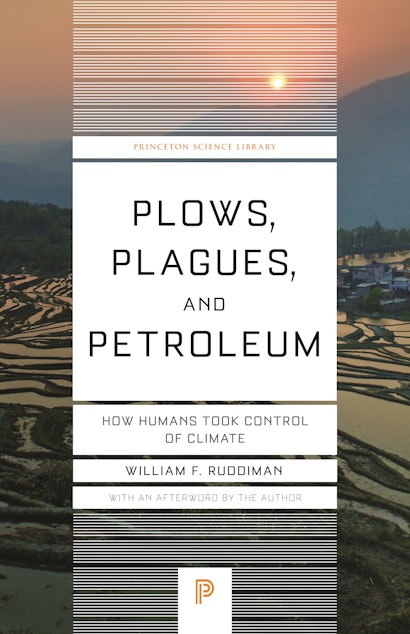The impact on climate from 200 years of industrial development is an everyday fact of life, but did humankind’s active involvement in climate change really begin with the industrial revolution, as commonly believed? Plows, Plagues, and Petroleum has sparked lively scientific debate since it was first published—arguing that humans have actually been changing the climate for some 8,000 years—as a result of the earlier discovery of agriculture.
The “Ruddiman Hypothesis” will spark intense debate. We learn that the impact of farming on greenhouse-gas levels, thousands of years before the industrial revolution, kept our planet notably warmer than if natural climate cycles had prevailed—quite possibly forestalling a new ice age.
Plows, Plagues, and Petroleum is the first book to trace the full historical sweep of human interaction with Earth’s climate. Ruddiman takes us through three broad stages of human history: when nature was in control; when humans began to take control, discovering agriculture and affecting climate through carbon dioxide and methane emissions; and, finally, the more recent human impact on climate change. Along the way he raises the fascinating possibility that plagues, by depleting human populations, also affected reforestation and thus climate—as suggested by dips in greenhouse gases when major pandemics have occurred. While our massive usage of fossil fuels has certainly contributed to modern climate change, Ruddiman shows that industrial growth is only part of the picture. The book concludes by looking to the future and critiquing the impact of special interest money on the global warming debate. In the afterword, Ruddiman explores the main challenges posed to his hypothesis, and shows how recent investigations and findings ultimately strengthen the book’s original claims.
Awards and Recognition
- Winner of the 2006 Book Award in Science, Phi Beta Kappa
"[A]n excellent book summarizing and placing in context the age-old influence of humans on atmospheric composition, climate and global warming."—Nature
"If you're not familiar with Ruddiman's hypothesis, you should be. . . . Plows, Plagues, and Petroleum is excellent reading for scientist and nonscientist alike."—James White, Science
"Ruddiman's argument makes it clear that there is no 'natural' baseline of climate in the late Holocene from which to reckon the human impact of the past two centuries."—Wolfgang H. Berger, American Scientist
"What is most remarkable about Ruddiman's work is the evidence it provides for an initial disruption to the climate system that occurred long before the industrial revolution—around 8,000 years ago. . . . Ruddiman's realisation that the gaseous composition of Earth's atmosphere is an exquisitely sensitive barometer of changes to life itself represents a great breakthrough."—Tim Flannery, Guardian
"William Ruddiman's provocative but plausible conclusion is that the economic behavior of humans began to profoundly influence global climate roughly 8000 years ago. . . . Ruddiman's book has already begun to spark an important debate—a debate which economic historians should be eager to follow and join."—Robert Whaples, EH.net
"This well-written book does a great job of summarizing complex topics through simple calculations and examples, and provides the right balance of cultural background and scientific data."—Matthew S. Lachniet, Geotimes
"The book by Ruddiman is very enjoyable and easy to read. It also takes quite a unique perspective on the relationship between human societies and climate. For Ruddiman, rather than the climate being a determinant of the course of human events, the argument is turned on its head making human economic behavior a cause of climate change, even well into distant antiquity."—Arlene Miller Rosen, Nature and Culture
"Ruddiman's short book is an excellent primer on the various influences on global climate. He explains scientific concepts clearly and accessibly, and his melding of climate science and human history is fascinating. For these reasons alone, the book is worth reading."—Erik M. Conway, Journal of the History of Biology
"Plows, Plagues, and Petroleum is a primer on natural variations in Earth's climate and on how human activity is having even more of an impact. While some readers might find it disturbing that people have been influencing the planet's climate for millennia, others may be even more alarmed to think about climate changes yet to come."—S. Perkins, Science News
"[Ruddiman] reviews the ongoing debate about future climate change and provides a balanced and judicious assessment of the challenges ahead. This book offers valuable new insights into one of the world's most demanding environmental challenges."—Population and Development Review
"The book is instructive and refreshingly non-technical in its prose. It also offers insight to historians as to how they might think about scientific and environmental processes . . . And draw on these materials to write history. . . . Given our contemporary industrial capacity, it rises some serious questions and concerns over the fragility of the physical environment and our relationship with it."—Michael Egan, Left History
"Contentious though they are, Ruddiman's arguments are never mere speculation. The book does an excellent job explaining the basic atmospheric science behind glacial cycles, and it presents convincing quantitative evidence of past atmospheric changes, pointing out the likely role of anthropogenic deforestation and agriculture in the late Holocene. The author's credentials as an established climate scientist lend further weight to the theory."—Sam White, Technology and Culture
"Bill Ruddiman's provocative suggestion of early human influence on the atmosphere will draw fire. But I stand with Ruddiman: the simultaneous upward departures of CO2 and CH4 from climate indicators, unique in 420,000 years, is probably an early footprint of humankind."—James Hansen, Director of NASA's Goddard Institute of Space Studies
"First came Rats, Lice and History�£����, Guns, Germs, and Steel. Now we have Plows, Plagues, and Petroleum, a book sure to inspire further thinking about the nature of anthropogenic climate change. Even those who question Ruddiman's central thesis—that pre-industrial humans caused enough climate change to head off a minor glaciation—will find that it serves as a great organizing principle for a thoroughly delightful and accessible romp through the physics of climate."—Ray Pierrehumbert, Professor of Geophysical Sciences, University of Chicago
"Bill Ruddiman has long been considered one of the world's top paleoclimatologists. In Plows, Plagues, and Petroleum, he caps a career at the cutting edge with a great new scientific debate. The book makes for good reading, too. Humans have a long record of altering their climate system and are now changing the climate system like never before. What's more, we're doing it knowingly."—Jonathan T. Overpeck, Director, Institute for the Study of Planet Earth and Professor of Geosciences, University of Arizona
"Plows, Plagues, and Petroleum boldly and creatively revisits the role of humans in climate change. Progress in science requires innovation, and when dealing with science, Ruddiman is world-class. This book is certain to be controversial, but even if all the bold new ideas presented here don't survive intact, it will have substantially moved our dialogue on the Earth forward and focused a bright light on the role of humans—for better or for worse—in taking control over our planet."—Stephen H. Schneider, Melvin and Joan Lane Professor for Interdisciplinary Environmental Studies and Co-Director, Center for Environmental Science & Policy at the Stanford Institute for International Studies, Stanford University
"Bill Ruddiman, one of the giants of climate history, presents a controversial hypothesis for early human influence on Earth. Our ancestors clearly altered their environment in many ways, and Ruddiman proposes that humans even affected the composition of the atmosphere. Vigorous research is testing this new idea, and should lead to an improved understanding of the world, and of ourselves."—Richard Alley, Evan Pugh Professor of Geosciences, Pennsylvania State University, author of The Two-Mile Time Machine
"This book represents a major and welcome endeavor to bridge the gap between the sciences and history. The two are brought together to achieve a greater understanding of climate change, which seems to be of increasing importance to our species. Few persons could accomplish these goals, but Ruddiman does so, and he does it well."—David C. Smith, Professor Emeritus of History at the Climate Change Institute, University of Maine, author of H. G. Wells: Desperately Mortal


